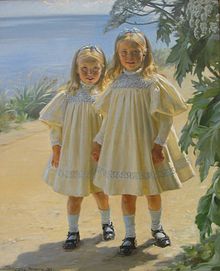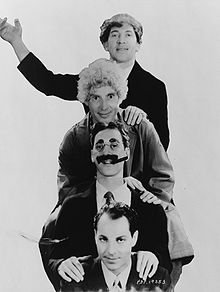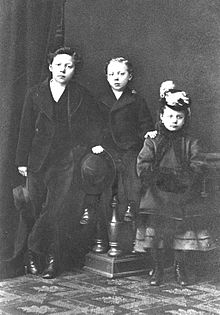- Birth order
-
Birth order is defined as a person's rank by age among his or her siblings. Birth order is often believed to have a profound and lasting effect on psychological development. This assertion has been repeatedly challenged by researchers, yet birth order continues to have a strong presence in pop psychology and popular culture.
Contents
Theories
Alfred Adler (1870-1937), an Austrian psychiatrist, and a contemporary of Sigmund Freud and Carl Jung, was one of the first theorists to suggest that birth order influences personality. He argued that birth order can leave an indelible impression on an individual's style of life, which is one's habitual way of dealing with the tasks of friendship, love, and work. According to Adler, firstborns are "dethroned" when a second child comes along, and this may have a lasting influence on them. Younger and only children may be pampered and spoiled, which can also affect their later personalities.[1] Additional birth order factors that should be considered are the spacing in years between siblings, the total number of children, and the changing circumstances of the parents over time.
Since Adler's time, the influence of birth order on the development of personality has become a controversial issue in psychology. Among the general public, it is widely believed that personality is strongly influenced by birth order, but many psychologists dispute this. One important modern theory of personality states that the Big Five personality traits of Openness, Conscientiousness, Extraversion, Agreeableness, and Neuroticism represent most of the important elements of personality that can be measured. Contemporary approaches to birth order frequently suggest that birth order influences these five traits.
In his book Born to Rebel, Frank Sulloway suggests that birth order has strong and consistent effects on the Big Five personality traits. He argues that firstborns are more conscientious, more socially dominant, less agreeable, and less open to new ideas compared to laterborns.[2] However, critics such as Fred Townsend, Toni Falbo, and Judith Rich Harris, argue against Sulloway's theories. An issue of Politics and the Life Sciences, dated September, 2000 but not published until 2004[3] due to legal threats from Sulloway (who claimed its content to be defamatory, although it was carefully and rigorously researched and sourced), contains criticisms of Sulloway's theories, including studies that show conflicting findings.
In their book Sibling Relationships: Their Nature and Significance across the Lifespan, Michael E. Lamb and Brian Sutton-Smith make the point that sibling relationships often last an entire lifetime. They point out that the lifespan view proposes that development is continuous, with individuals continually adjusting to the competing demands of socialization agents and biological tendencies. Thus, even those concerned only with interactions among young siblings implicitly or explicitly acknowledge that all relationships change over time and that any effects of birth order may be eliminated, reinforced, or altered by later experiences.[4]
Personality
Claims about birth order effects on personality have received only mixed support in scientific research. Such research is a challenge because of the difficulty of controlling all the variables that are statistically related to birth order. Family size, and a number of social and demographic variables are associated with birth order and serve as potential confounds. For example, large families are generally lower in socioeconomic status than small families. Hence third born children are not only third in birth order, but they are also more likely to come from larger, poorer families than firstborn children. If third-borns have a particular trait, it may be due to birth order, or it may be due to family size, or to any number of other variables. Consequently, there are a large number of published studies on birth order that vary widely in quality and are inconsistent in their conclusions.
Literature reviews that have examined many studies and attempted to control for confounding variables tend to find minimal effects for birth order. Ernst and Angst reviewed all of the research published between 1946 and 1980. They also did their own study on a representative sample of 6,315 young men from Switzerland. They found no substantial effects of birth order and concluded that birth order research was a "waste of time."[5] More recent research analyzed data from a national sample of 9,664 subjects on the Big Five personality traits of extraversion, neuroticism, agreeableness, conscientiousness, and openness to experience. Contrary to Sulloway's predictions, they found no significant correlation between birth order and self-reported personality. There was, however, some tendency for people to perceive birth order effects when they were aware of the birth order of an individual.[6]
Other studies have supported Sulloway's claims about birth order. Paulhus and his colleagues found consistent support in self-reports by both student and adult samples. First borns scored higher on conservatism, conscientiousness and achievement orientation. Later borns scored higher on rebelliousness, openness, and agreeableness. The authors argued that the effect emerges most clearly from studies within families. Results are weak at best, when individuals from different families are compared. The reason is that genetic effects are stronger than birth order effects.[7] Recent studies also support the claim that only children are not markedly different from their peers with siblings. Scientists have found that they share many characteristics with firstborn children including being conscientious as well as parent-oriented.[8]
In her review of the research, Judith Rich Harris suggests that birth order effects may exist within the context of the family of origin, but that they are not enduring aspects of personality. When people are with their parents and siblings, firstborns behave differently than laterborns, even during adulthood. However, most people don't spend their adult lives in their childhood home. Harris provides evidence that the patterns of behavior acquired in the childhood home don't affect the way people behave outside the home, even during childhood. Harris concludes that birth order effects keep turning up because people keep looking for them, and keep analyzing and reanalyzing their data until they find them.[9]
Jane Austen's book Pride and Prejudice, while being a study on a certain form of courtship, also places stringent analysis on the personalities on five sequential daughters.
Intelligence
Since the 1970s, one of the most influential theories to explain why firstborns frequently score higher on intelligence and achievement tests than other children is the confluence model of Robert Zajonc. This model states that because firstborns mainly have adult influences around them in their early years, they will spend their initial years of life interacting in a highly intellectual family environment. This effect may also be observed in siblings who, although later born, have a sibling at least five years senior with no siblings in between. These children are considered to be "functional firstborns". The theory further suggests that firstborns will be more intelligent than only children, because the latter will not benefit from the "tutor effect" (i.e. teaching younger siblings).
Zajonc's theory has been criticised for confounding birth order with both age and family size, and researchers such as D. F. Polit and T.with one other sibling score higher on tests of verbal ability than laterborns and children with multiple siblings.[10] This observation does support a conclusion, more modest than the confluence model's stronger claims, that smaller families lead to children with higher test scores. However, when the metanalysis tested more specific claims by comparing firstborns against the members of the other groups also occupying the upper performance tier (i.e., singletons and children with one and only one sibling), it found that firstborns do not enjoy any advantage over the members of the other groups, suggesting that either a) firstborns do not enjoy any advantage not also enjoyed by those other groups' members or at least b) to whatever extent firstborns do enjoy unique advantages, members of the other upper-tier groups enjoy offsetting advantages not shared by firstborns.
While more consistent with resource depletion theory (RDT) than with the confluence model, these findings also cast doubt upon the claim that RDT is the sole cause of any correlation that in fact exists: Were RDT the exclusive explanation, only children would have an advantage over firstborns (given that siblings divert at least some resources from both "true" and "functional" firstborns regardless of age difference). The metanalysis, however, finds no such effect, leaving open the null hypothesis that other factors, including but not limited to those enumerated in the confluence model, have some offsetting effect. For example, in multiple-child families, academic achievent often serves as one of several arenas in which siblings compete for parental affection and other resources. In well-functioning families, firstborns reap the side effects not only of tutoring younger siblings (see above) but also of competing against those siblings to some degree and strengthening themselves in the process. In families where sibling rivalry reaches a pathological level, and especially when a scarcity of parental resources such as affection exacerbates already-severe rivalry, firstborns may be less willing to give away competitive advantage by sharing knowledge with their siblings, but the firstborns in question will by that same token likely study harder for their own benefit, gaining reinforcement similar to what they would realize from the teaching process. In each case, other factors at least partially offset the obstacles to achievement that resource depletion poses, especially in the context of comparing siblings' achievements to those of singletons who engage in neither tutoring nor inter-sibling competition. Moreover, younger as well as firstborn siblings benefit from the process of competing for parental resources that are finite even when they are abundant, meaning that resource depletion is not the only factor in play even for children in the "lower tier," that encompassing laterborns and children with multiple siblings, who do not enjoy any advantage not also enjoyed by firstborns.
The basic finding that firstborns have higher IQ scores has itself been disputed. One group of researchers examined data from the National Longitudinal Survey of Youth (NLSY) (USA), which gave them the opportunity to look at a large randomly selected sample of US families. The sample included children whose academic performance had been reviewed multiple times throughout their academic careers. This study found no relationship between birth order and intelligence. Recent studies of eldest children by both the Harvard Medical Journal (Aug. 2009) and a thesis published by Swedish research scientist Lars Orstenberg (see 'Younger Children, Brighter Futures', May 2009, Bazar Förlag Press) suggested that past research focuses too heavily on early life. Both papers point to a distinctly higher rate of success among second borns later in life in the areas of career as well as wealth.[11]
Sexuality
The fraternal birth order effect is the name given to the observation that the more older brothers a man has, the greater the probability is that he will have a homosexual orientation. The fraternal birth order effect is the strongest known predictor of sexual orientation, with each older brother increasing a man's odds of being gay by approximately 33%.[12][13] Even so, the fraternal birth order effect only accounts for a maximum of one seventh of the prevalence of homosexuality in men. There seems to be no effect on sexual orientation in women, and no effect of the number of older sisters.
In the book Homosexuality, Birth Order, and Evolution: Toward an Equilibrium Reproductive Economics of Homosexuality, Edward M. Miller suggests that the birth order effect on homosexuality may be a by-product of an evolved[citation needed] mechanism that shifts personality away from heterosexuality in laterborn sons. This would have the consequence of reducing the probability of these sons engaging in unproductive competition with each other. Evolution may have favored biological mechanisms prompting human parents to exert affirmative pressure toward heterosexual behavior in earlier-born children: As more children in a family survive infancy and early childhood, the continued existence of the parents' gene line becomes more assured (cf. the pressure on newly-wed European aristocrats, especially young brides, to produce "an heir and a spare"), and the benefits of encouraging heterosexuality weigh less strongly against the risk of psychological damage that a strongly heteronormative environment poses to a child predisposed toward homosexuality.
See also
References
- ^ Adler, A. (1964). Problems of neurosis. New York: Harper and Row.
- ^ Sulloway, F.J. (2001). Birth Order, Sibling Competition, and Human Behavior. In Paul S. Davies and Harmon R. Holcomb, (Eds.), Conceptual Challenges in Evolutionary Psychology: Innovative Research Strategies. Dordrecht and Boston: Kluwer Academic Publishers. pp. 39-83. Full textPDF (325 KB)
- ^ Harris, Judith Rich (2006), No Two Alike: Human Nature and Human Individuality (pp. 107-112)
- ^ Lamb, M. E., Sutton-Smith, B. (1982).Sibling Relationships: Their Nature and Significance of the Lifespan. Lawrence Erlbaum Associates.
- ^ Ernst, C. & Angst, J. (1983). Birth order: Its influence on personality. Springer.
- ^ Jefferson T., Herbst J. H., McCrae R. R. (1998). "Associations between birth order and personality traits: Evidence from self-reports and observer ratings". Journal of Research in Personality 32 (4): 498–509. doi:10.1006/jrpe.1998.2233.
- ^ Paulhus D.L., Trapnell P.D., Chen D. (1998). "Birth order effects on personality and achievement within families". Psychological Science 10 (6): 482–488. JSTOR 40063474.
- ^ [|van der Leun, Justine] (October 2009). "Does Birth Order Really Matter?". AOL Health. http://www.aolhealth.com/health/birth-order/. Retrieved October 2009.
- ^ Harris, J. R. (1998). The Nurture Assumption: Why children turn out the way they do. New York: Free Press.
- ^ Polit D. F., Falbo T. (1988). "The intellectual achievement of only children". Journal of Biosocial Science 20 (3): 275–285. doi:10.1017/S0021932000006611. PMID 3063715.
- ^ Rodgers, JL; Cleveland, HH; Van Den Oord, E; Rowe, DC (2000). "Resolving the debate over birth order, family size, and intelligence". The American psychologist 55 (6): 599–612. doi:10.1037/0003-066X.55.6.599. PMID 10892201.
- ^ Blanchard R (2001). "Fraternal birth order and the maternal immune hypothesis of male homosexuality". Hormones and Behavior 40 (2): 105–114. doi:10.1006/hbeh.2001.1681. PMID 11534970. http://www.ncbi.nlm.nih.gov/entrez/query.fcgi?cmd=Retrieve&db=PubMed&list_uids=11534970&dopt=Abstract.
- ^ Puts, D. A.; Jordan, C. L.; Breedlove, S. M. (2006). "O brother, where art thou? The fraternal birth-order effect on male sexual orientation" (PDF). Proceedings of the National Academy of Sciences 103 (28): 10531–10532. doi:10.1073/pnas.0604102103. PMC 1502267. PMID 16815969. http://msu.edu/~breedsm/pdf/BogaertCommentary2006.pdf.
External links
Categories:- Human development
- Psychological theories
- Adlerian psychology
Wikimedia Foundation. 2010.



